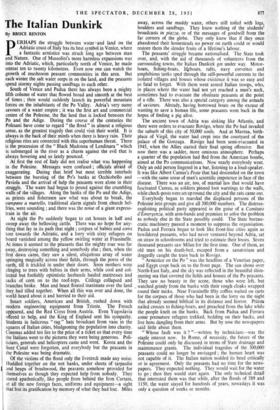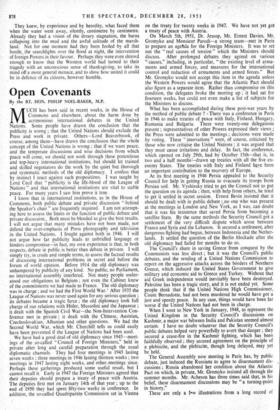The Italian Dunkirk
By BRUCE RENTON
pERHAPS the struggle between water sand land on the Adriatic coast of Italy has its best symbol in,Venice, where a fantastic armistice was struck long ago between man and Nature. One of Mussolini's more harmless expansions was into the Adriatic, which, particularly north of Venice, he made retreat ten to twenty kilometres. Even now one can watch the growth of mushroom peasant communities in this area. But each winter the salt water seeps in on the land, and the peasants spend stormy nights passing sandbags to each other. South of Venice and Padua there has -always been a mighty fifth column of water that flowed broad and smooth at the best of times ; then would suddenly launch its powerful mountain forces on the inhabitants of the Po Valley. Adria's very name savours of a water empire; it was the first art and commercial centre of the Polesine, the flat land that is locked between the Po and the Adige. During the course of the centuries the Polesani have come to regard "the flood" in almost a religious sense, as the greatest tragedy that could visit their world. It is always in the back of their minds when there is heavy rain. Their religious rites are connected with this superhuman threat. There is the procession of the "Black Madonna of Lendinara " which is submerged in the river as a charm against the evil that is always hovering and so lately pounced. '
At first the rest of Italy did not realise what was happening in the Polesine. Messages were confused ; officials afraid of exaggerating. During that brief but most terrible interlude between the bursting of the Po's banks at Occhiobello and Paviola and the arrival of help the peasants were alone in their struggle. The water had begun to pound against the crumbling walls of the villages. Along the banks of the Po and the Adige, as priests and fishermen saw what was about to break, the campane a marten°, traditional alarm signals from church bel- fries, were sounding ; and there was the noise of a giant express- train in the air.
At night the Po suddenly began to cut, houses in half and sweep away the bellowing cattle. There was no hope for -any- thing that lay in its path that night ; corpses of babies and cows tore towards the Adriatic, and a lorry with sixty refugees on board vanished among the yellow swirling water at Frassinelle. At times it seemed to the peasants that the mighty roar was far away, destroying something and somebody else ; then, when the first dawn came, they saw a silent, ubiquitous army of water springing magically across their fields, through the .pores of the earth, till it trickled in under their doors. Soon mothers were clinging to trees with babies in their arms, while cool and col- lected but foolishly optimistic husbands hauled mattresses and sacks of corn on to the roof-tops. Ceilings collapsed and branches broke. Man and beast floated inanimate over the land they had tilled together. When all this was over and done, the world heard about it and hurried to their aid.
Smart soldiers, American and British, rushed down with modern engineering equipment from Trieste. The French appeared, and the Red Cross from Austria. Even Yugoslavia offered to help, and the King of England sent his sympathy. Students in ludicrous " rag " hats broadcast from vans in the squares of Italian cities, .bludgeoning the population into charity. Cinemas added ten lire to the price of a ticket so that every time the Italians went to the pictures they were being generous. Poli- ticians, generals and helicopters came and went Korea and the Suez Canal were forgotten, and everybody but the peasants in the Polesine was being dramatic.
Of the victims of the flood only the livestock made any noise. Huddled together on the wet banks, under sheets of tarpaulin and heaps or brushwood, the peasants somehow provided for themselves as though they expected help from nobody. They stared apathetically, like people from behind the Iron Curtain, at all the new foreign faces, uniforms and equipment—a sight that lost its gratification by memory of what they had lost. Miles away, across the muddy water, others still toiled with logs, boulders and sandbags. They knew nothing of the students' broadcasts in piazza, or of the messages of goodwill from the far corners of the globe. They only knew. that if they once abandoned their homesteads no power on earth could or would restore them the slender fruits of a lifetime's labour.
The peasants' struggle became nationalised. The State took over, and, with the aid of thousands of volunteers from the surrounding towns, the Italian Dunkirk got under way. Motor- boats, fishing-boats, lifeboats, rafts, navy corvettes and amphibious tanks sped through the still-powerful currents to the isolated villages and houses whose existence it was so easy and so fatal to forget. With them went armed Italian troops, who, in places where the water had not yet reached a man's neck, sometimes had to evacuate the obstinate peasants at the point of a rifle. There was also a special category among the armada of saviours. Already, having borrowed boats on the excuse of wanting to save a human life, some peasants went back in the hopes of finding a pig alive.
The ancient town of Adria was sinking like Atlantis, and there were orders to evacuate Rovigo, where the Po had invaded the suburb of this city of 50,000 souls. And at Mantua, birth- place of Virgil, the water had crept into the courtyard of the palace of the Gonzaga. Rovigo had been semi-evacuated in 1945,. when the Allies started their final spring offensive. But now there was a sadder, more ominous atmosphere. Perhaps a quarter of the population had fled from the American bombs, aimed at the Po communications. Now nearly everybody went. Only an odd person lingered in a bar, listening to a loud-speaker. It was like Albert Camus's Peste that had descended on the town —with the same sense of man's scientific impotence in face of the disease. There was an air, too, of martial law that would have fascinated Camus, as soldiers pinned loot warnings to the walls, while check-posts were set up round the city and the rats came out.
Everybody began to marshal the displaced persons of the Polesine into groups and give all 300,000 numbers. The distress- exploiting political party appeared in the guise of a Comitat° d'Emergenza, with arm-bands and promises to solve the problem as nobody else in the State possibly could. The State bureau- cratic machinery paused a moment to suppress the organisation. Padua and , Ferrara began to look like front-line cities again as bewildered peasants, who had never ventured beyond Adria, sat on straw in schoolrooms and tried to estimate their losses. Seven thousand peasants saw Milan for the first time. One of them, an old man on his death-bed, escaped from a sanatorium and doggedly caught the train back to Rovigo.
Armistice on the Po" was the headline of a Venetian paper, and Egypt crept back on to the front page. The sun shone over North-East Italy, and the sky was reflected in the beautiful shim- mering sea that covered the fields and houses of the Po peasants. They saw no beauty in the scene, those who were left, but _ watched grimly from the banks with their rough cloaks wrapped round their necks. Near Frassinelle fifty coffins waited on carts for the corpses of those who had been in the lorry on the night that already seemed biblical in its distance and horror. Priests nailed crosses to fishing-boats, and preached from the lake while the people knelt on the banks. Back from Padua and Ferrara some- premature refugees trekked, bedding on their backs, and live hens dangling from their arms. But by now the newspapers said little about them.
"Whose fault was it ? "—written by technicians—was the staple interest now. In Rome, of necessity, the future of the Polesine could only be discussed in terms of State drainage and maintenance grants. The individual tragedies of the 300,000 peasants could no longer be envisaged ; the human heart was not capable of it. The Italian nation nodded its head critically or in agreement. Only the peasants had no time for the news- papers. They expected nothing. They would wait for the water to go ; then they would start again. The only technical detail that interested them was that while, after the floods of 589 and 1150, the water stayed for hundreds of years, nowadays it was only a question of weeks or months. They knew, by experience and by heredity, what faced them when the water went away, silently, centimetre by centimetre. Already they had a vision of the dreary stagnation, the barns collapsing into the mud and the awful solitude of the marsh- land. Not for one moment had they been fooled by all that bustle, ,the searchlights over the flood at night, tile intervention of foreign Powers in their favour. Perhaps they were even shrewd enough to know that the Western world had turned to their tragedy with an unconscious sense of thanksgiving, to take its mind off a more general menace, and to show how united it could be in defence of its citizens, however humble.































 Previous page
Previous page